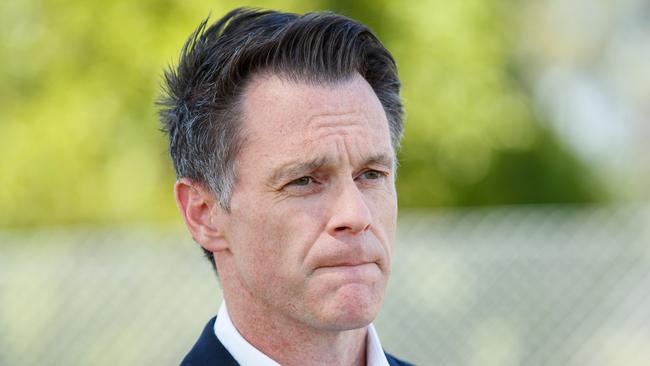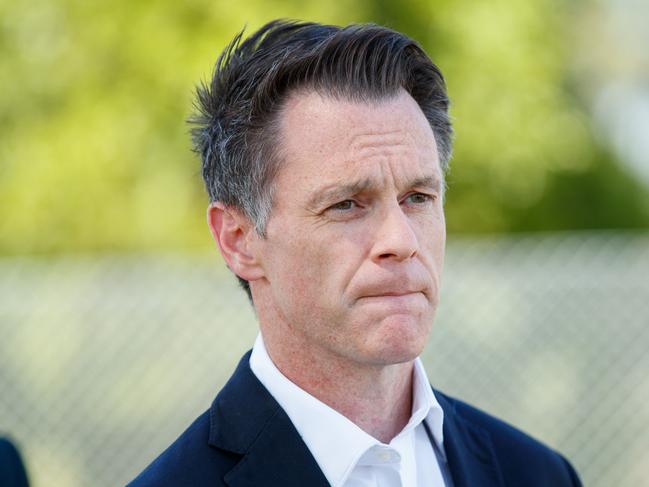Metro, motorways and hospitals hit by electrical union industrial action
Premier Chris Minns says he can’t intervene in an ongoing industrial dispute delaying billions of dollars of NSW public infrastructure projects because the companies involved are privately owned.
News
Don't miss out on the headlines from News. Followed categories will be added to My News.
Billions of dollars of public infrastructure projects across NSW, including the Southwest Metro, could face delays due to a crippling electrical union pay dispute.
The battle between the Electrical Trade Union (ETU) and the state’s energy companies could see South Sydney residents wait even longer for the delivery of the new Metro line from Sydenham to Bankstown, with the Minns government arguing there is little they can do to end the dispute.
But the Premier said on Tuesday he had not “ducked” his responsibilities in not intervening.
“These are private companies I mean, in the instance of me sitting down and speaking on behalf of one of those private companies that would be akin to me to saying to Qantas if they were in a dispute with the Transport Workers Union ‘Well you need to pay this outcome, you need to pay this wage outcome’, I’ve got a limited ability to do that,” he told 2GB’s Ben Fordham.
“ I haven’t ducked my responsibility, and the government hasn’t ducked this responsibility in relation to industrial disputes in the state.”

Among the hundreds of projects impacted by the ETU’s protected industrial action are state significant government projects including the $2.1 billion extension to the M1 motorway and the redevelopment of John Hunter Hospital in the Hunter Valley. The union has also banned members from completing certain works at the new Sydney Fish Market development.

The nine-month-long pay dispute between the ETU and the state’s major energy companies Endeavour, Ausgrid, Essential Energy and Transgrid has resulted in the delay of hundreds of residential developments and public infrastructure projects.
It is understood that there is significant concern within multiple NSW government departments that the rolling industrial action could have a significant effect on the ability for the projects to be delivered on time.
As part of their protected industrial action electrical workers have refused to turn off two 33kV cables for the conversion of the southwest Metro. One will need to be removed permanently and the other re-energised.
A Sydney Metro spokesperson said the line was “currently on track”, however The Daily Telegraph is aware of concerns within Sydney Metro as to the impact of these bans.
“Metro is evaluating the possible impact of work bans on the conversion delivery timetable and will work to avoid delays wherever possible,” the spokesperson said.
“Fencing work in proximity to the 33kV feeders has been able to progress without the need to isolate power, meaning there has been no impact to the delivery program.”

The ETU’s protected industrial action will also impact the upgrade to the M1 motorway, with the union banning power poles along the proposed road from being relocated.
Despite this a Transport for NSW spokesperson said the road extension was still on track for a 2028 delivery.
It is understood there are several bans preventing certain works from taking place at the John Hunter Health and Innovation precinct despite a NSW Health spokesperson saying there are no delays to the project.
“Health Infrastructure is actively working with Ausgrid to address any potential impacts on construction activities for the John Hunter Health and Innovation Precinct,’ the spokesperson said.
Works on the new Sydney Fish Market precinct have also been impacted with the ETU refusing to recommission a number of substations required for the project to be completed.
A government spokespeson said there would be no impacts to the work schedule as the connections of the substations could occur next year.
Electrical workers have twice rejected a pay offer by Ausgrid – including 12.4 per cent over three years — while a 15.7 per cent offer from Endeavour Energy over four years was also recently voted down, with that matter expected to be resolved in the Fair Work Commission on Tuesday.
NSW opposition leader Mark Speakman accused the Minns government of failing to try to put an end to the dispute.
“Chris Minns is doing nothing while the ETU holds the South West Metro conversion hostage,” he said.
“Sadly it’s no surprise, with … unions like the ETU controlling Labor preselections, determining policy at Labor State Conference, paying affiliation fees and making political donations.”

A NSW government spokesperson said there was limited action that could be taken due to the privatisation of the energy companies by previous governments, despite still being the largest shareholder of Endeavour and Ausgrid, with full ownership of Essential Energy.
“The NSW Government is continuing to work with both the union and energy companies while considering options to help resolve this dispute,” the spokesperson said.
ETU NSW secretary Allen Hicks said they would only end the industrial action when energy companies agree to their wage demands.

“Any suggestion that development connection delays are the fault of workers is wrong and misleading,” he said.
“These time frames are controlled by energy companies and affected by multiple factors including building approvals, material shortages, project scheduling, and administrative processes – all within company control.”
A spokesperson for Endeavour Energy rejected Mr Hicks’s claims saying delays to major developments were due to protected industrial action undertaken by the ETU and not due to its scheduling.
“The ETU has cancelled more than 1800 planned outages, needed to work safely on the network,” the spokesperson said.
“It has also created significant delays to major developments across Endeavour Energy’s area including State Significant infrastructure including around the Aerotropolis and Transport for NSW projects.”
Ausgrid Group executive for people and culture, Celina Cross said the wage offer which ETU rejected was the strongest in the company’s history.
“The protected industrial action is centred on activities which have the most significant impact on our customers and this impact is becoming devastating for many of them,” she said.


